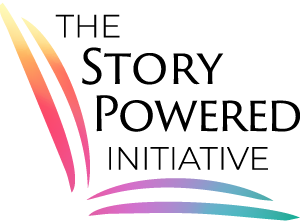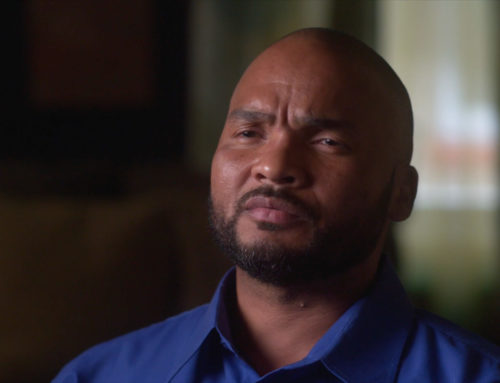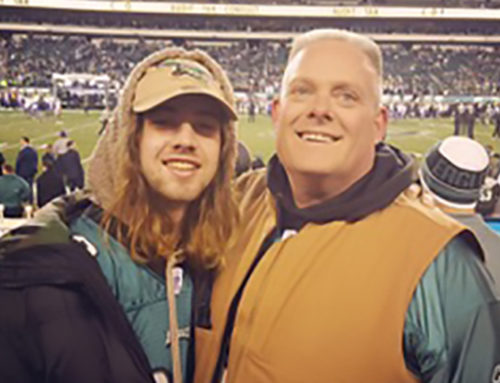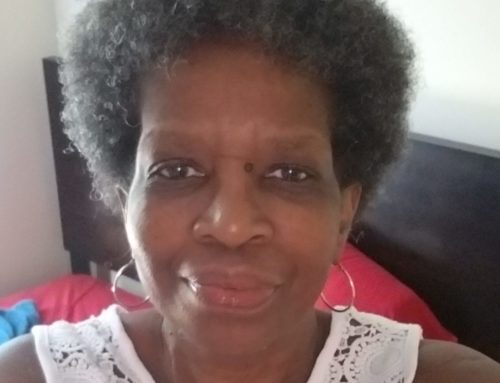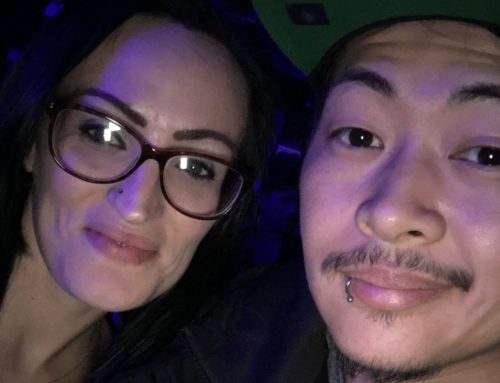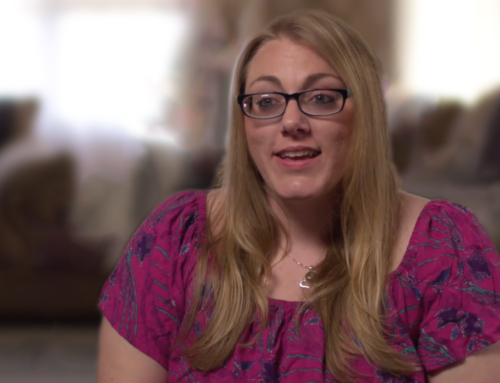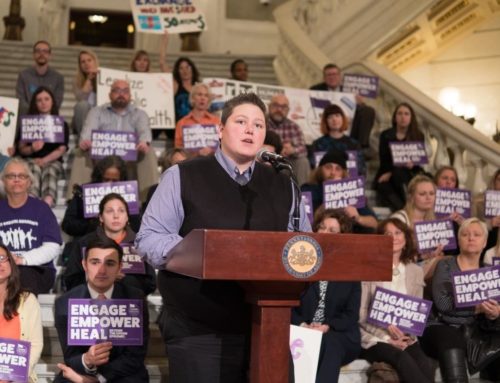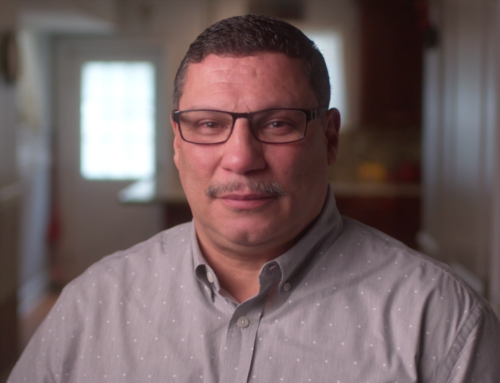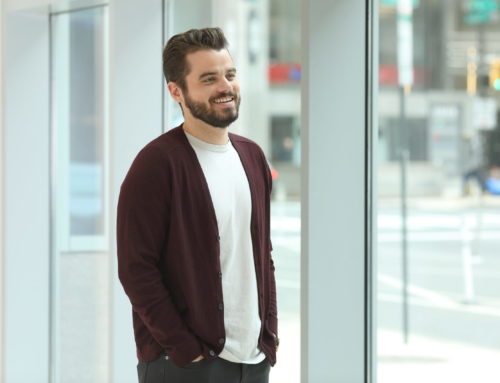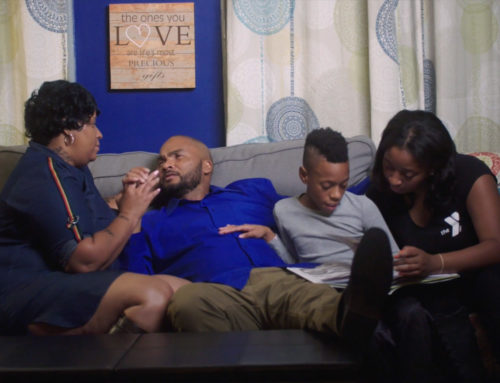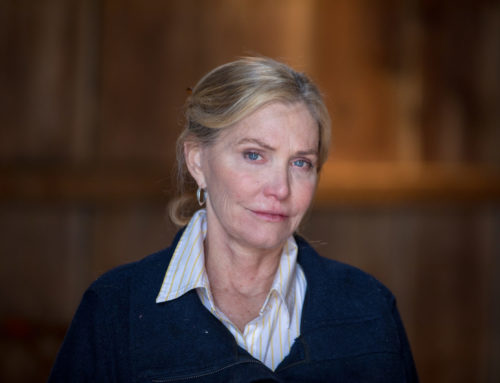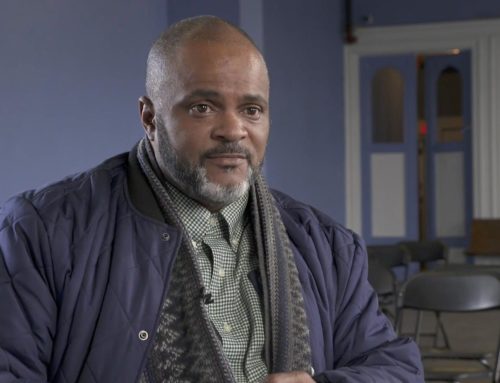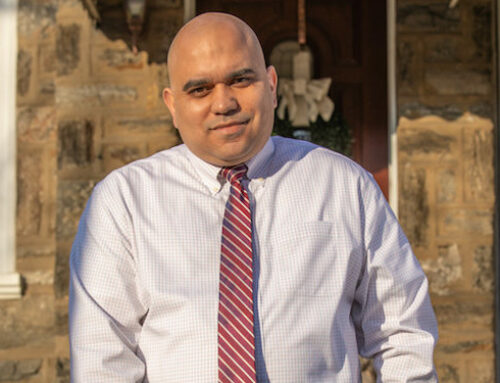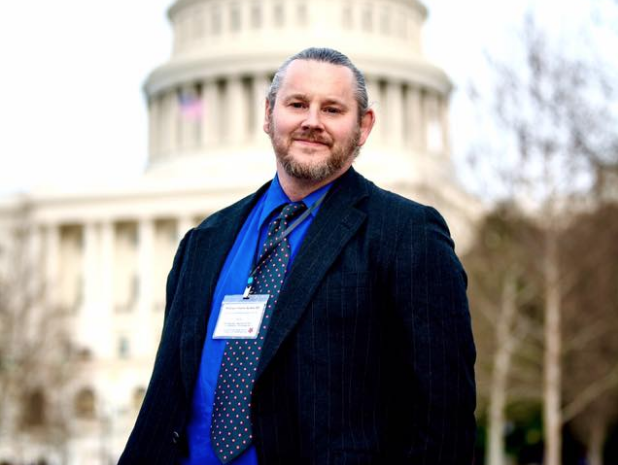
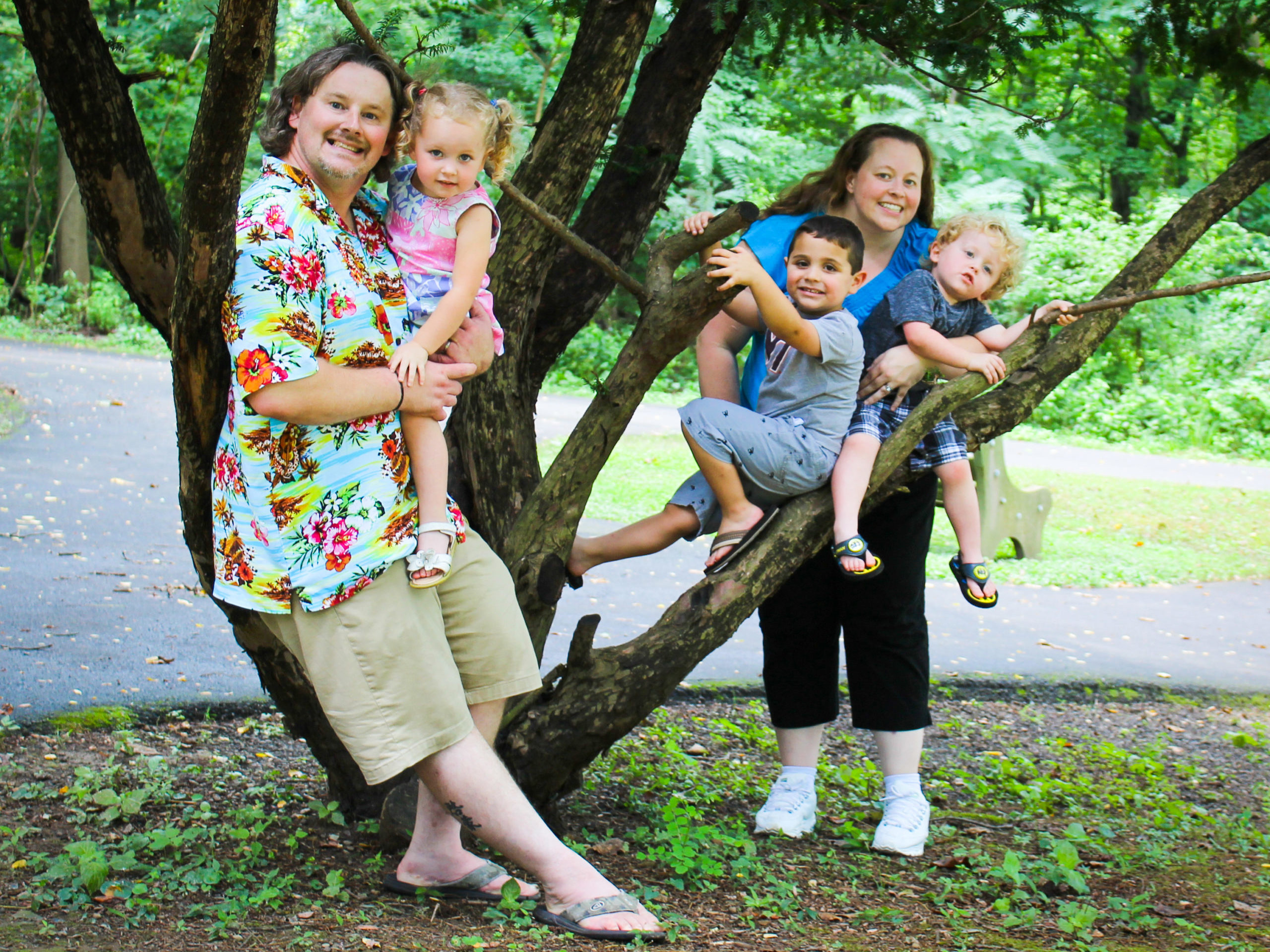
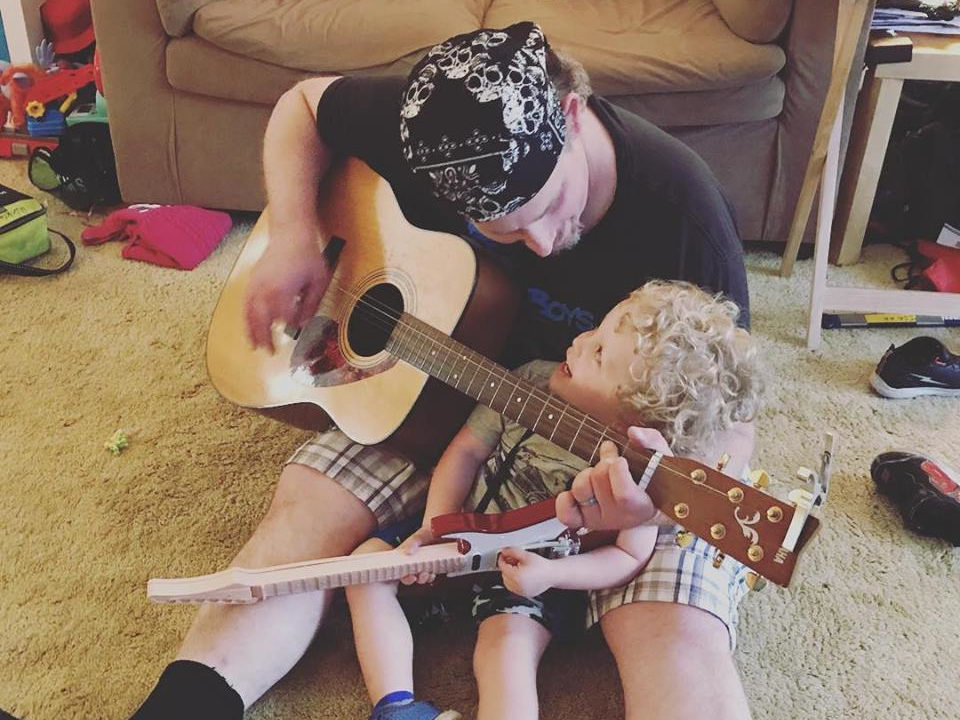
"Being able to speak openly and publicly about my struggle with opioid use disorder has given me great strength."
Homeless in Kensington, I was always looking for places to stay, and one of the places where I sought refuge was one of the homes where I spent the majority of my childhood. I was in that house and I went down to the basement. It was during the daytime, so there was a little bit of light but not much. We had some candles burning for light and I was just sitting around kicking some of the rubble and junk and pieces of wood when I found a bunch of things that were left over from the prior occupants of the home. In that pile was a photo. I recognized immediately that it was me and my parents from the 1970’s.
I am currently 45 years old, happily married with three wonderful children. I grew up in an average, blue-collar family in Philadelphia. Although I did suffer an isolated incident of childhood sexual abuse, my childhood was uneventful and happy. Upon graduating high school at the age of 17, I entered the healthcare workforce as a nursing assistant. I quickly developed a passion for healthcare and became and emergency medical technician (EMT), which was followed by completing a paramedic training program.
I passed the state certification exam at the age of 19 and found myself immersed in the strange environment of first responders. I would routinely be confronted with making life and death decisions. I had to learn how to generate confidence when I was summoned at 3:00 A.M., and the expectation of the calm to come rested on me. I had to find a way to bury the enormous burden of seeing the very worst of human experience – all at an age when only one year prior I gained the right to vote and still couldn’t legally step foot into a liquor store.
I continued to walk this dual line of responding when anyone was in need while at the same time looking for spare emotional space to pack away the effects of trauma I vicariously suffered from these experiences. I eventually became a registered nurse and worked in a busy level–one trauma center in Philadelphia where we cared for several victims of gun violence a week along with people suffering from every imaginable tragedy life has to offer. I was never the type of person who learned how to leave the job at work and I often replayed events, decisions I made, mistakes etc., in my mind. Moreover, even today I can describe with precision the details of some people’s hands as their color drained or the contour of their face as life slipped from their bodies while our team worked frantically to keep them alive.
My job didn’t end at the termination of a resuscitation effort. I was one of the people responsible to prepare the body for the family to view their loved one and gently bring them the bad news. After a person’s family was finished viewing their loved one’s body and they left the hospital to go home to grieve, we wrapped the body, preserved evidence, and delivered the deceased to the hospital morgue. We then had to put everything behind us and move on to the next patient. To be efficient as an emergency nurse I didn’t have the capacity to process through emotions, debrief trauma, or even talk with peers. Everything was compartmentalized, hopefully discarded, and I moved on to the next person who was in need.
I did not begin using substances to manage my emotions from job related secondary trauma, but I mention this to help the reader understand events that increased my vulnerability to developing a substance use disorder. This question has persisted in my mind for a decade: why did opioid addiction happen to me? Did it have to happen the way it did? What could have been done earlier to mitigate the damage done? I still have no way of knowing if things would have ever been different, but I am very well aware of life events that increased my vulnerability.
I was first exposed to opioids in 2004 after suffering a kidney stone. My initial contact with oxycodone was monumentally memorable; it felt as though all the burdens of the world were lifted and I had clarity. Nevertheless, when the prescription was gone, the experience was also over, and I moved on with life. However, four years later I was experiencing divorce and became depressed. My depression was undiagnosed and untreated, it’s only in hindsight that I am able to identify my dilemma. I was working in the surgical intensive care unit at the time and accidentally went home with a small amount of intravenous opioid medication in my pocket. I was at home in my basement, feeling desperate and down so I tried it. The results produced everything I desired. My emotions were neutralized, I felt clear and together again, so I began to make this a daily ritual. Within a month I transitioned to heroin, and within six months I had lost my career, professional license and was homeless.
Six months prior, I had been halfway around the world in Australia on an international stage, speaking in front of thousands of people about health care and medicine, reaching the pinnacle of my career. Juxtapose that with six months to the day later, here I am with no possessions, living in this abandoned house, and I find the photo of my family from when I was a baby. Often people speak about the need to “hit bottom” or have a “wake-up call” when they talk about overcoming addiction. I’ve found “hitting bottom” to be a destructive myth. I had many moments that could be described as a bottom, however none of them were enough to make me “snap out of it” as has been suggested. We now understand that the notion of “hitting bottom” directly contradicts the precise diagnostic indicator we use to identify substance use disorder: continued use despite negative consequences. If there is one thing we should fight for it is to abandon the idea that a person needs to “hit bottom” to recover. For too many people hitting bottom means ending up in a casket.
I ultimately experienced all the things one might expect a person with a SUD to experience: countless overdoses, multiple arrests, poverty, assaults, stabbings etc. Furthermore, at one point I was being held in the county jail for a forgery charge on a $100 bail I couldn’t afford. While in jail, awaiting trial (innocent in the eyes of the law), I was raped. Ultimately, I was offered freedom in exchange for a guilty plea, which I accepted, and I continue to work through the restrictions my felony conviction carries.
Upon release from jail, I wasn’t sure where to go and eventually ended up in a Christian recovery house. At the time I was a devout atheist, however I enjoyed the people in the house and became increasingly interested in the Christian faith. I remained in recovery for five years, and over that time I married my current wife, earned a bachelor’s degree in biblical science and completed two years of graduate education in seminary, preparing for a new career in the ministry. The people I met in the recovery house, although well meaning, were misguided about what science and research has taught us about substance use disorder and the links to trauma. Over this five–year period, I did nothing to treat my underlying mental illness. I was convinced that prayer was all I needed to heal. Moreover, I was persuaded to abandon medicine. My mentors saw my passion for medicine as an idol, something evil and satanic that would only create hardship.
My wife, Trish, and I became foster parents of a beautiful two–week–old boy named Micah, and then four months later became pregnant with twins. Over the following year I became very close with Micah and would routinely have to compartmentalize the increasing fears that there would be a day when he would be reunited with his biological parents, who were also our friends. When our twins were born I experienced significant attachment issues. I often heard all of the different emotions a father experiences when they hold their children for the first time, and I had none of them; for me it was complete emptiness. It is very difficult to explain what that felt like, to want more than anything to feel joy and love but only have a blank space. This led to deep despair, depression, and sorrow. I don’t remember the day or what I was thinking, but I began to use heroin again. In hindsight, it was to resume functionality in my life again. This has been the benefit of experiencing a recurrence of use, I have been able to pinpoint parallels in both times I began using opioids and see common patterns which I can use as a predictive or prognostic indicator in the future.
I desperately wanted to stop and initially relied on my faith to try and eliminate this burden. However, what I found is the more I prayed for relief, the more I used heroin. Moreover, as my family reached out to church leadership seeking help, the church seemed to move further from us. My faith began to dwindle as my desperation increased. This was in the age of fentanyl, so overdoses were more common and the predictability of the drugs I purchased was non–existent. This is typically what happens in an underground, unregulated market: frequently, supplies are adulterated and mixed with poisons resulting in harm to the user.
So, I began entering treatment facilities: 16 over an 18-month period to be exact. I found myself using opioids within the first three hours after discharge every time for the first 15 treatments. Cravings would set in and were uncontrollable. You see, I am a nurse, and that means that I am mandated to only use abstinence-based options for recovery. A non-healthcare professional who enters treatment as often as I did, exhibiting symptoms as severe as me would’ve had a significant amount of counseling to encourage them to begin buprenorphine (Suboxone) to mitigate the very real possibility of overdose and death. However, for me, medication was off the table as an option, so I had to white knuckle my entrance into recovery. Moreover, my family had to suffer two years of me being admitted into inpatient facilities where access even to my voice was restricted for them and used as a means to force me to participate in treatment, all of which was 12-step based. To communicate with my family and see my children I had to complete written “step work.” My wife, Trish, essentially functioned as a single parent, caring for three toddlers, fielding visits from Micah’s social worker, working full time, paying the bills, managing her own emotions all while having no contact with any of the treatment facilities I stayed in. As I mentioned earlier, there were many things I think would’ve made my transition into recovery much easier. One of the things I feel strongest about was offering me alternative paths to recovery considering I attempted the 12-step model many, many times before without success.
Today I am in sustained recovery. During the first year of my recovery, we adopted Micah, our Eagles won the Super Bowl, I quickly became employed, and we are now rebuilding our lives. I am in a state monitoring program to have my nursing license reinstated. However, there are many requirements I need to fulfill. Attendance and participation in 12-step meetings are an integral part of this program and I don’t find them helpful. Keeping up with the requirements of my professional program limits the time I can devote to working through past trauma to prevent potential future recurrences of use. In addition, random drug testing is a daily part of my life, and when I am selected to provide a specimen, I report to a collection site where I interact with other nurses who know the reason I am there. I am required to empty my pockets, be searched, and be watched as I provide a urine specimen. As a rape survivor, the experience re-traumatizes me every time I go and it is distinctly reminiscent of jail procedures. All of this to say, I am an active supporter of the individual designing and following their own path to recovery and wellness. Too often and for too many years we have forced patients into a specific path to recovery, and this practice harms people.
The majority of my time is filled serving as an advocate for others suffering with substance use disorder and in recovery, particularly healthcare professionals. Being able to speak openly and publicly about my struggle with opioid use disorder has given me great strength. For many years I was ashamed and kept my struggle very quiet, which only made me sicker. This is one reason why I refuse to only use my last initial. First, it is traumatic for me as the only time I’ve been referred to as “Bill K” has been in treatment. Second, and most importantly, I am not ashamed of my struggle with OUD, therefore I refuse to be anonymous in my recovery. Anonymity has fostered too much shame and killed too many of my friends, I won’t be silent anymore.
One project that I started with a physician friend in recovery is a podcast for health professionals in the hope that we might provide a resource for others who are struggling. As a person whose career was devoted to the care of others, one thing I found is that I have a difficult time finding the dividing line where the pain of the world ends and my own pain begins. Part of my recovery path is to make that line less blurry and connecting with other caregivers has been an instrumental part of that process.
I have a unique skill set having worked as a paramedic and nurse for so many years and having lived through ten years of struggling with opioid use disorder. I’ve gained a significant amount of experiential knowledge, however I’ve also spent the past few years studying the disorder from an academic, advocacy, and harm-reduction viewpoint. With those experiences together, I’ve been able to create a fairly comprehensive presentation that I feel is valuable to healthcare providers. Typically, what I received in nursing school was information based on unrealistic accounts, not first person experience. I’ve made it my personal passion to train and educate caregivers on substance use disorders in the hope that we will be able to eliminate stigma and ultimately save lives.
This is why I am sharing my story. Recovery for me has nothing to do with counting days on a calendar or adhering to strict abstinence. How I gauge recovery is through subjective, every day experiences with my family. Recovery is all about the little things, being a silly dad, putting the kids to bed at night, playing games with them, having my daughter do my hair. Recovery for me is all about personal happiness and how that happiness spreads to the people I am around; in a sense recovery is infectious.
